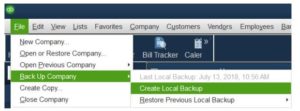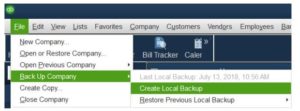
Backing up your QuickBooks company file may seem like an additional task, especially as we start another tax season, but don’t let it lose it’s importance. Regardless of where your QuickBooks desktop software is installed, and regardless of where your QuickBooks company file resides, you need to run your own bona fide QuickBooks backup of that data file from inside of QuickBooks.
Why are QuickBooks Backups Important?
The backup feature in QuickBooks includes a data verification process that ensures the data is stored safely and correctly within the data tables, all debits are correctly linked to matching credits, every name is unique, dollars values match up accurately, encryption processes are working correctly, and finally, the transaction log file is refreshed if the verification confirms that all transactions are in order and safely stored. At least weekly, run the backup process with full verification enabled.
Can I let my IT Company Make a QuickBooks Backup?
Too many QuickBooks users are lulled into a sense of false security. It’s a mistake to assume your I.T. person’s definition of “backup” is the only definition. I assure you, it isn’t. In the I.T. world, a backup is a “duplicate copy.” If you have a local computer network, the odds are you have a network server computer storing and serving your data files and documents, and that server is automatically “backed up,” copied, onto a separate local or offsite storage device. That’s a good thing. But your IT person assumes it is enough and therefore, so do you. It’s not!
For example, a client of mine found out that their QuickBooks data file was severely fragmented and hopelessly corrupted. In fact, it was so corrupt that Intuit was unable to repair it. The normal solution is to restore a backup copy of the data from a date prior to when it became corrupted. But there wasn’t a true backup copy, only duplicate copies from the server being copied daily. So sure, there were 30 copies of the file from the last 30 days, but the corruption began months earlier and it wasn’t detected until the file simply stopped functioning. Every copy was also corrupted. No true backup existed. This would have been avoided entirely if the backup feature inside of QuickBooks had been used on a regular basis.
Can my QuickBooks Hosting Company Create a Backup?
Hosting companies provide the same false security because you assume your QuickBooks file is being stored in multiple locations by the hosting company. Maybe it is, maybe it isn’t. The same problem exists because no matter how many copies of the file they have, if the file is corrupted, then all copies are equally bad. Again, using the backup feature within QuickBooks with verification turned on will not only allow you to store a copy of your data in the location of your choice, but it also warns you as soon as any file corruption occurs, so you can repair it immediately.
In 2019, a well-known, highly reputable hosting company was hit by ransomware. Any client who didn’t have their own local backup of their QuickBooks file was completely out of commission until the hosting company could regain control of their systems. It took days to resolve the issue. Can you run your business for a week or more without access to your financial data? What if you need to record sales orders, purchase orders, payments to vendors and from customers, incoming inventory, or manufacturing processes? How long can you do that on paper before it’s hopeless?
What’s the Best Number of Backups to Keep?
You can’t have too many copies of your data, any data, if it’s crucial to running your business. I use Qbox so I can access my QuickBooks files from several computers at different locations. I know that the Qbox servers save redundant copies of my data files which helps enormously if I need to restore an earlier copy but failed to make my own backup. They saved one of my clients from a crisis when the accountant accidentally accessed the data file via Qbox using the wrong version of QuickBooks, inadvertently upgrading the file to a newer QuickBooks version. The Qbox support team was able to restore the previous copy of the data so the accountant didn’t have to buy the client new software. Using Qbox doesn’t absolve me of the responsibility from making frequent backups because I still need to maintain the integrity of the file, and I need to keep those backups in multiple local and cloud locations so no matter what happens, I can get back up and running if disaster strikes.
When is a QuickBooks Backup not a Backup?
The answer is when it’s a copy. Use the internal QuickBooks backup feature in single user mode with full verification turned on. Also, don’t just rely on the “scheduled” backup feature in QuickBooks which is useful, but incomplete. Then store those *.QBB files in two or more locations, at least one locally and one in the cloud. If your QuickBooks is hosted, fine. Create a folder on your remote desktop and store the *.QBB files in the folder and also store them in a folder on your own local PC.
Learn how to create your own QuickBooks backup using our step-by-step instructions here!
Share on facebook
Facebook
Share on twitter
Twitter
Share on linkedin
LinkedIn

